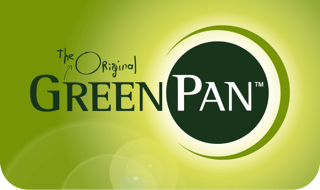
Australia’s PFAS Ban: What It Means for You - And Your Kitchen
The heightened awareness of the dangers of PFAS chemicals has motivated health-conscious consumers to seek out PFAS-free products. For us at GreenPan, creating the world’s finest, PFAS-free, non-stick ceramic cookware has been one of our primary driving goals.
What Are PFAS Chemicals & Why Are They Bad For You?
PFAS stands for per- and polyfluoroalkyl substances, a blanket term for a large family of over 10,000 human-made compounds¹. Most will be familiar with the substance called polytetrafluoroethylene, or PTFE, better known by its trademark Teflon2. By 1951, a French engineer figured out how to bond Teflon to aluminium and the first non-stick cookware was born3. When the US FDA approved Teflon for use in food processing equipment, the non-stick cookware boom took the culinary world by storm. Over the next few decades, non-stick cookware became a fixture in kitchens across the globe, as it still is today.
Soon, product developers realised that the same properties that made PTFE perfect for cookware, had almost limitless other commercial applications such as take-away packaging, clothing, cosmetics, fire retardants, and an almost limitless list of other products used by millions of people every day. This resulted to the development of more varieties of PFAS chemicals, such as PFOA, PFOS and more. Today, there are over 10,000 different PFAS chemicals that make up this family tree.
Over the years, a growing body of evidence has emerged linking PFAS chemicals to a smorgasbord of human illnesses. And since PFAS chemicals take hundreds, if not thousands, of years to break down, they have been steadily accumulating in our environment, contaminating the earth, vegetation and groundwater.
In Australia, our very own Department of Defence was slapped with payouts to the tune of almost A$350 million for contaminating sensitive ecosystems with PFAS-containing firefighting foams in 2020 and 20234. And in 2024 a study released by the University of NSW5, exposed scandalously high levels of PFAS chemicals in Australian water.
Governments across the globe have been rushing to implement legislation to ban or phase out the use of these “forever chemicals”. However, despite the global trend, PFAS chemicals have not been legally banned in Australia…until now.
July 1st - Australia’s PFAS Ban Comes Into Effect
From July 1st, any company in Australia found to be manufacturing, using, importing, or exporting products with three specific PFAS groups - perfluorooctane sulfonate (PFOS), perfluorooctanoic acid (PFOA), and perfluorohexane sulfonate (PFHxS) - will face significant fines and other penalties. 6As you can imagine, given the ubiquity of PFAS chemicals in many products used daily, companies are running themselves ragged to ensure compliance.
Numerous government departments and agencies have spent years contributing to a coordinated effort to reach this point. Finally, in mid-2023, the Commonwealth proposed strict legislative measures targeting PFAS7 chemicals that will impose bans, restrictions and risk management measures on their importers, manufacturers and users.
This follows on from previous legislation passed by the state governments of Queensland8, New South Wales9 and South Australia10, which had already established some strict PFAS chemical management criteria for those states. For the most part, these local guidelines covered the use of PFAS chemicals in fire extinguishers and flame retardants, that triggered the DOD case mentioned above. However, they represented an important initial step towards the more comprehensive, national ban that is about to come into effect.
A Healthier Way Forward: Non-Toxic Cookware
Since traditional non-stick coatings hit the shelves in the mid-1950s, consumers had become accustomed to easy-glide, non-stick surfaces. But what does it take for a company to make non-stick cookware that is non-toxic and free of forever chemicals? This challenge is nowhere near as easy as it sounds:
- Increased R&D to identify and develop alternative, non-toxic materials that met the required performance criteria.
- Significant development efforts are needed to reformulate cookware coatings to safely and reliably integrate these materials into products.
- Intense supply chain management and transparency to ensure that no PFAS materials are used or included in any of the components or materials.
- Elevated compliance requirements with new regulations and quality assurance standards.
As you can imagine, clearing these bars required a significant investment and a firm dedication to creating exceptional, safe-to-use products.
GreenPan - A Global Pioneer Ceramic Non-Stick Cookware
From the beginning, GreenPan has never shied away from these or other challenges. In 2007, our founders turned their transformative vision into reality with the launch of Thermolon™, our cookware with non-toxic, non-stick ceramic coating. Since then, we’ve continued to lead the way with innovative technology and global best practices that set the standard for outstanding, healthy, and environmentally conscious cookware and bakeware.
GreenPan is one of a tiny handful of cookware brands that manufactures its own coatings. This provides us with ultimate, unmatched control of the quality and safety of every product that leaves our facilities. It means we can stand by the promise that our cookware is healthy with ceramic coating containing zero harmful chemicals, such as PFAS, cadmium, lead, and others.
Just as importantly, we understand the product also needs to work well and meet the requirements for high functionality and ease of use that modern households demand. That’s why we invest heavily in R&D and have incorporated numerous technological cookware innovations into our products.
The result is visually stunning, high-performance cookware that you’ll love to use, while maintaining peace of mind that you and your family are safe from harmful chemicals.
GreenPan and the Australian PFAS Ban
We’re proud to be one of this country’s most loved and trusted cookware brands that produce healthy cookware that are free of PFAS, lead and cadmium.
Many Australians are aware of alarming reports of PFAS chemicals in our drinking water, or have heard of toxic fumes caused when scratched or otherwise compromised non-stick cookware is exposed to high heat. While we like to think of ourselves Aussies as a green bunch, research data show a worrying fact: Australia has a higher incidence of PFAS chemicals in its environment than many other countries.
While those Forever Chemicals are sure to be lurking everywhere we look for thousands of years to come, this is our chance to slam on the brakes and start the long trek towards a PFAS-free planet.
To find out more about GreenPan’s superb range of PFAS-free, non-stick ceramic cookware and state-of-the-art kitchen appliances, visit our online cookware store to see for yourself which of our gorgeous GreenPan cookware collections is right for you.
Enjoy happy, healthy cooking!
Note:
1. MasterClass, Aug 5, 2021: Cooking Oils and Smoke Points: What to Know and How to Choose the Right Cooking Oil
2. How Stuff Works: How Nonstick Cookware Works - Nonstick Cookware History
3. Compound Interest, February 2016: Chemical History: Teflon & Non-Stick Pans
4. Clayton Utz, Insights, Feb 2024: New PFAS ban underscores need to deal with PFAS contamination across wide range of Australian businesses
5. Sherry Landow, UNSW Sydney, April 9th, 2024: PFAS 'forever chemicals' above drinking water guidelines in global source water
6. Parliament of Australia, Select Committee on PFAS , July 2024: Submission 72 [PDF] 1 PFAS in Australia – Brief – July 2024 Summary of Concerns
7. NSW EPA, 28th July, 2023: Commonwealth Proposes Bans on PFAS
8. Queensland Government Dept of Environment, Land & Water: How Nonstick Cookware Works - Nonstick Cookware History
9. NSW EPA, 1st February, 2021: Regulation of PFAS firefighting foams
10. South Australia EPA, Per- and poly-fluoroalkyl substances (PFAS)
11. Department of Climate Change, Energy, The Environment & Water: Per- and poly-fluoroalkyl substances (PFASs)






